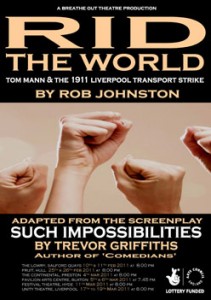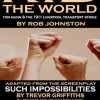 Cast: Hugo Chandor, Andrew Sykes, Lewis Marsh, Andrew Roberts-Palmer.
Cast: Hugo Chandor, Andrew Sykes, Lewis Marsh, Andrew Roberts-Palmer.
The year 1911 could be seen as a corner stone in the life of Liverpool and yet the life of Tom Mann and The Liverpool Transport Strike of that year is not readily available for the youth and teenagers growing up in the city to learn about.
Thankfully with the run up to the 100th anniversary of this momentous occasion Breathe Out Theatre have adapted Trevor Griffiths Such Impossibilities and created a hard hitting play called Rid the World.
With a packed and eager audience to satisfy, the events that led up to one of the most significant moments in the history of the city and the brutal aftermath that was wrecked upon those that took part in the strike were treated by the authorities were poignantly and carefully weaved together by the strong writing of Rob Johnson and the superb cast who threw themselves into every word and every painful nuance as they spoke the words of ghosts long gone but never should be forgotten.
Playing the titanic role of Tom Mann himself was the splendid Hugo Chandor, whose stirring, gravel tones showed his belief completely in the role he was playing. Never once did Hugo unwavering loyalty to the man he was portraying give way in the eyes of those assembled and it’s easy to see from this portrayal why Tom Mann was seen as convincing and forthright, honest man.
With the sparse set being expertly used by the actors there was plenty of scope for the drama to be seen from the two points of view in the debate. The worker-owner relationship being explored well between Hugo and Andrew Sykes as Cuthbert Laws, the mutual loathing they felt for Charles Cavendish and his ways of dealing with the strike only tempered for their distaste in each other’s company.
A play like this should be more readily available to the greater population and its own way could be seen on a par, locally, with Robert Tressell’s The Ragged Trousered Philanthropists. A play with a very powerful message behind it and one that still needs to be heard.
Ian D. Hall
